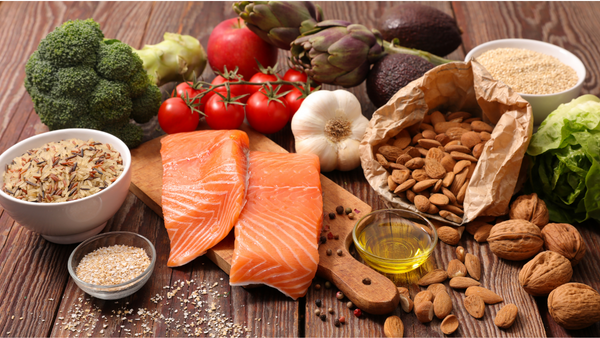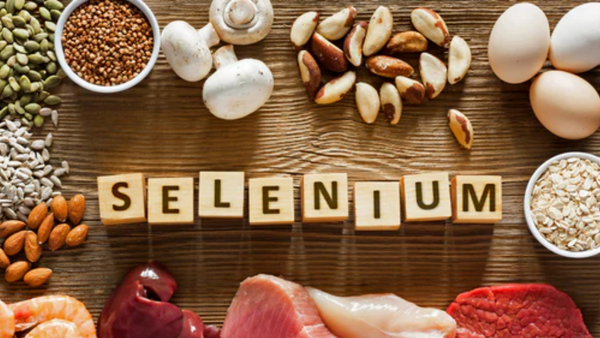Vitamin B12 is an essential nutrient that our body cannot produce itself. Therefore, we must get it from food. Like all other B vitamins, vitamin B12 is water-soluble.
Vitamin B12 has important functions in fat and protein metabolism. It is also important for nerve regeneration and contributes to the formation of red blood cells. [1]
In our detailed article on vitamin B12 you will learn more about why vitamin B12 is so important. Here you will find out which foods you can use to meet your vitamin B12 needs.
Vitamin B12 requirements
According to the DGE, the daily requirement of vitamin B12 is 4 µg for adults. Pregnant and breastfeeding women have a slightly increased requirement of 4.5 and 5.5 µg respectively. [2]
IT'S WORTH READING!
AT THE END OF THE ARTICLE WE WOULD LIKE TO GIVE YOU A LITTLE JOY WITH A VOUCHER!
 Vitamin B12 is only found in animal foods. However, we can store large amounts of vitamin B12 (approx. 2,000 - 5,000 µg) in our liver and these stores can last for several years even with a vegan diet. However, it is not possible to cover our vitamin B12 needs in the long term with a vegan diet .
Vitamin B12 is only found in animal foods. However, we can store large amounts of vitamin B12 (approx. 2,000 - 5,000 µg) in our liver and these stores can last for several years even with a vegan diet. However, it is not possible to cover our vitamin B12 needs in the long term with a vegan diet .
These are the 10 best sources of vitamin B12:
1. Mussels
Oysters & Co are very popular in French cuisine, but unfortunately not widely used in German cuisine.
Mussels are the best source of vitamin B12: they provide 99 µg per 100 g, which is more than 20 times the daily requirement! [3] Mussels are also superstars when it comes to minerals: they provide a good portion of iron, potassium, zinc, copper , manganese and selenium. They also provide valuable omega-3 fatty acids, although they are generally low in fat. Lots of good reasons to try them!
2. Beef liver
Liver is not for everyone either. But it is also an excellent source of vitamin B12. Beef liver, for example, contains 71 µg of vitamin B12 per 100 g, which is several times the daily requirement. [4] It also provides all other B vitamins in generous amounts and is the absolute leader when it comes to vitamin A. Liver is also a good source of many minerals such as iron, zinc , copper and selenium.
3. Octopus
Let's stick with the exotic foods: octopus. Octopus provides a full 36 µg of vitamin B12 per 100 g. It also provides a good portion of vitamin B2, vitamin B3 and vitamin B5 and is rich in calcium, iron, magnesium, copper and selenium . [5]
4. Mackerel
The fatty mackerel is also an excellent source of vitamin B12 with 19 µg per 100 g. [6] It also provides generous amounts of valuable omega-3 fatty acids , magnesium and selenium.
5. Crabs
And seafood again: Crabs are not among the top vitamin B12 sources, but 100 g provide 11 µg of vitamin B12 – more than double the daily requirement! In addition, they provide numerous minerals such as magnesium , zinc, copper and selenium. [7]

6. Beef
Meat is also a very good source of vitamin B12. Beef, for example, contains 6.2 µg of vitamin B12 per 100g. It also contains many other B vitamins and beef is also a very good source of iron, zinc and selenium.
7. Cheese
Although dairy products provide less vitamin B12 than fish, meat and seafood, they are still a good source. Cheese, for example, provides 3 µg of vitamin B12 per 100 g.
Cheese is also very rich in vitamin A and calcium. Cheese not only tastes better, it also provides valuable nutrients . [8]
8. Eggs
Eggs are incredibly versatile: fried, scrambled, poached or boiled in the shell. Eggs are also almost always used in baking. They not only contain 1.3 µg of vitamin B12 per 100 g, but also almost all other nutrients in generous quantities: high-quality protein with all essential amino acids , vitamin A, vitamin D , vitamin E, all B vitamins, and many minerals. [9] A breakfast egg therefore provides many important nutrients for the day!
9. Milk
Milk and dairy products are an important source of vitamin B12, especially for vegetarians. Milk contains 0.4 µg of vitamin B12 per 100g and is also rich in calcium and many other B vitamins. [10]
10. Yoghurt
As a dairy product, yoghurt contains 0.4 µg of vitamin B12 per 100 g, just like milk. The slightly sour taste of yoghurt is due to valuable probiotic lactic acid bacteria. In addition, yoghurt provides a lot of calcium, potassium and zinc.
Conclusion: Fish, seafood and meat provide the most vitamin B12

Vitamin B12 is only found in significant quantities in animal foods. The best sources of vitamin B12 include fish, seafood and meat. But eggs and dairy products are also good sources of vitamin B12. They are particularly important for vegetarians.
However, a vegan diet cannot cover the vitamin B12 requirement. Vegans are therefore advised to cover their vitamin requirements with a high-quality vitamin B12 product .
AS PROMISED, YOU WILL RECEIVE A 10% VOUCHER ON OUR VITAMIN B12 .
SIMPLY COPY THE CODE B12+V10 AND ENTER IT AT CHECKOUT.
Click here for product
[1] https://pubmed.ncbi.nlm.nih.gov/22332101/
[2] https://www.dge.de/forschung/referenzwerte/vitamin-b12/
[3] https://nutritiondata.self.com/facts/finfish-and-shellfish-products/4183/2
[4] Beef, variety meats and by-products, liver, cooked, braised Nutrition Facts & Calories (self.com)
[5] Mollusks, octopus, common, cooked, moist heat Nutrition Facts & Calories (self.com)
[6] Fish, mackerel, Atlantic, cooked, dry heat Nutrition Facts & Calories (self.com)
[7] Crustaceans, crab, Alaska king, cooked, moist heat Nutrition Facts & Calories (self.com)
[8] Cheese, swiss Nutrition Facts & Calories (self.com)
[9] Egg, whole, raw, fresh Nutrition Facts & Calories (self.com)
[10] Milk, whole, 3.25% milkfat Nutrition Facts & Calories (self.com)

















